To lease a car, you'll need to meet several essential requirements. First, a valid driver's license is important, along with proof of income—like pay stubs or tax returns—to confirm you can cover monthly payments. A solid credit score, ideally above 661, increases your chances of approval. You also need valid auto insurance with sufficient coverage. Expect to make a down payment, typically one or two monthly payments, plus be aware of possible additional fees. Finally, be clear on lease terms and mileage limits to avoid penalties. Stick around, and you'll uncover more helpful details!
Key Takeaways
- A valid and current driver's license issued in your state is essential for leasing a car.
- Proof of income, such as pay stubs or tax returns, demonstrates your ability to make monthly payments.
- Documentation verifying residency, like a utility bill or bank statement, is required for lease approval.
- Valid auto insurance that meets minimum coverage requirements must be maintained throughout the lease term.
- A good credit score, ideally above 661, increases your chances of lease approval and favorable terms.
Understanding Car Leasing Basics
Car leasing can be a smart choice if you want to drive a new vehicle without the long-term commitment of ownership. Fundamentally, a car lease is a contractual agreement that allows you to use a vehicle for a specified lease term, typically 2-3 years. Your monthly payments primarily cover the vehicle's depreciation rather than ownership costs.
When you approach a leasing company, you'll fill out a lease application, which will help determine your eligibility based on your credit score. Understanding the lease agreement is vital, as it outlines important factors like insurance requirements, mileage limits, and any penalties for exceeding those limits, typically set between 10,000 to 15,000 miles annually.
Most leases are closed-end, meaning you can return the vehicle at the end of the term without incurring additional costs, provided you meet the wear-and-tear guidelines. You'll also find options to buy the car at the end of the lease, offering flexibility.
As you consider this option, familiarize yourself with key leasing terms like acquisition fees and the money factor, as these will influence your overall costs and monthly payments.
Importance of a Good Credit Score
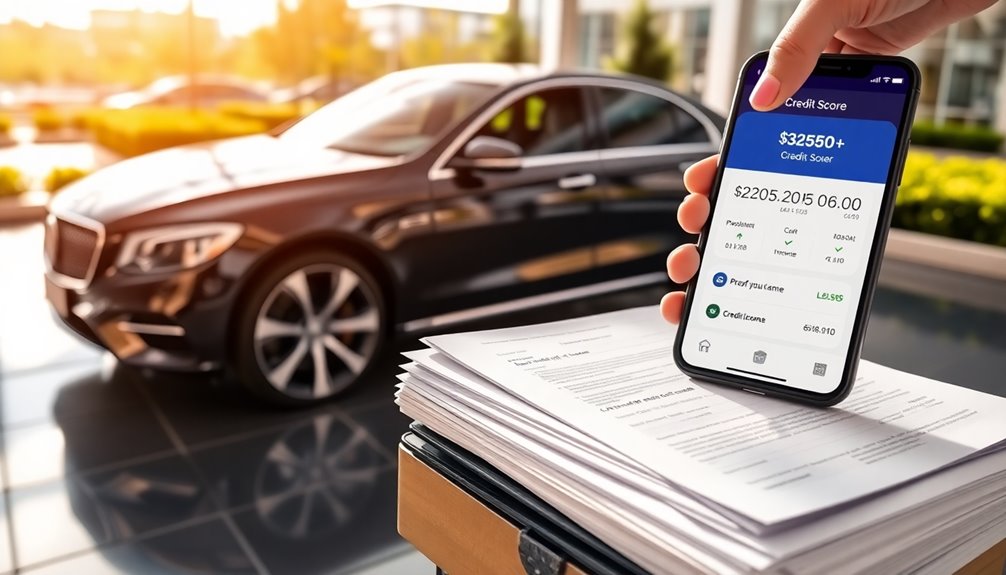
When it comes to leasing a vehicle, having a good credit score can make all the difference in securing favorable terms. A credit score above 661 considerably boosts your chances of lease approval, allowing you to negotiate lower monthly lease payments. In fact, the average credit score for individuals leasing vehicles in Q4 2023 was around 737, demonstrating that leasing companies often favor higher scores.
Your credit score plays an essential role in determining your financial capability. Leasing companies typically look for a gross monthly income at least three times the monthly lease payment, making a strong credit history vital.
If your score falls below 660, you might face higher interest rates and larger down payments, as lenders view you as a higher risk.
If you find yourself with poor credit, a co-signer with a strong credit history can help you qualify for a lease. This partnership can lead to better terms and lower costs.
Ultimately, maintaining good credit not only enhances your chances of lease approval but also guarantees you enjoy a smoother leasing experience with more favorable financial conditions.
Proof of Income Requirements

To lease a vehicle successfully, you need to provide proof of income, as this illustrates your ability to make monthly payments. Typically, dealerships want to verify that your gross monthly income is at least three times the monthly lease payment.
For salaried employees, recent pay stubs are required to demonstrate your earnings. If you're self-employed, you'll need to submit tax returns or bank statements to confirm your income.
Hourly workers must document their average hourly wage over the past three months to establish the necessary income level. This helps the dealership assess your financial responsibility and confidence in making payments on time.
In some cases, dealerships may also ask for references from past landlords or employers to further validate your lessee's ability to manage monthly obligations.
Valid Driver's License
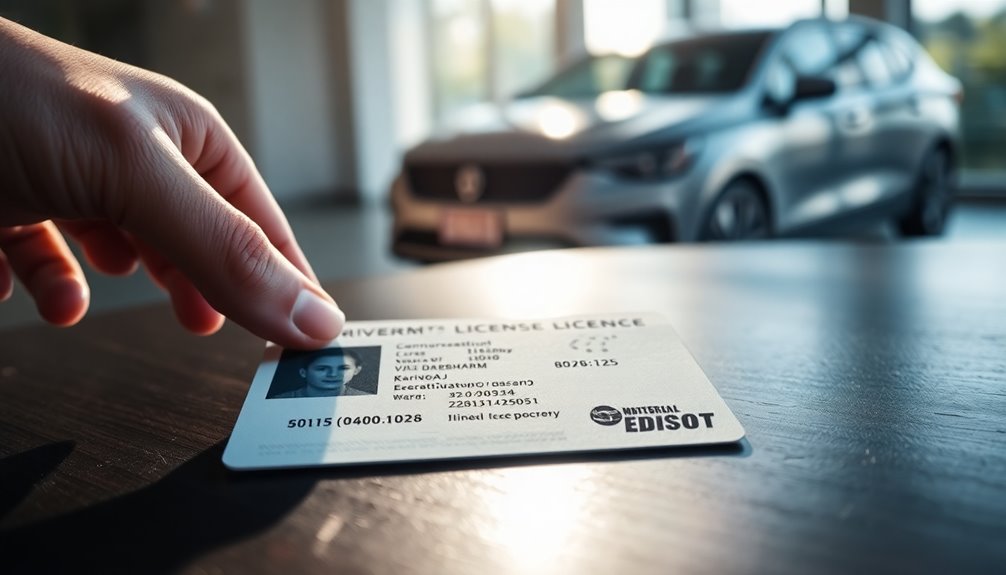
When you're ready to lease a car, having a valid driver's license is essential.
It not only proves your identity but also confirms your ability to drive legally.
Make sure your license is current and issued in your state to avoid any issues during the verification process.
Importance of Validity
A valid driver's license is vital for leasing a car, as it proves your identity and your ability to operate the vehicle legally. Leasing companies require an unexpired license issued in the same state where you're signing the lease agreement. This guarantees that you meet state requirements and that the information matches your lease application.
Having a clean driving record can further enhance your chances of approval, showing that you're a responsible driver. If your driver's license doesn't match the name or address on other documents, you might need to provide additional identification to clarify your identity.
Failing to present a valid driver's license during the leasing process can result in an immediate denial of the lease. This can be frustrating, especially if you've done everything else correctly.
As a result, it's imperative to verify that your license is current and meets all requirements before applying. Remember, the validity of your driver's license not only reflects your legal ability to drive but also plays a significant role in securing your lease.
License Verification Process
Verifying your driver's license is an essential step in the car leasing process, making certain that you meet all legal requirements before hitting the road. As a lessee, you must provide a valid driver's license during your application. This license must be unexpired and issued by the state where you reside, confirming your identity and compliance with local vehicle regulations.
Leasing companies often require a copy of your driver's license to maintain accurate records and verify your legal ability to operate the vehicle.
It's important to understand that some dealerships may perform additional checks to make sure your license has no significant violations or suspensions that could affect your lease approval.
Keep in mind that temporary or learner's permits typically don't qualify for leasing a vehicle; only full, unrestricted licenses are accepted. This is to guarantee that you have the eligibility necessary to drive safely and responsibly.
Auto Insurance Verification

When leasing a car, you need to provide proof of valid auto insurance that meets the leasing company's minimum coverage requirements.
Typically, this includes liability, collision, and extensive coverage, often starting at $100,000 in liability.
Without this proof, your lease application may not get approved, so it's essential to have your insurance in order before you finalize the agreement.
Proof of Coverage
Before finalizing your car lease, you'll need to provide proof of auto insurance that meets the leasing company's minimum coverage requirements. This proof typically includes liability coverage, collision, and extensive insurance to protect both you and the leasing company from financial loss. Maintaining continuous insurance coverage throughout the lease term is essential; failing to do so may lead to penalties or even lease termination.
To help you navigate your options, consider the following table:
| Coverage Type | Description |
|---|---|
| Liability Coverage | Covers bodily injury and property damage to others |
| Collision Insurance | Covers damage to your leased vehicle in an accident |
| Extensive Insurance | Covers non-collision-related incidents (e.g., theft) |
It's wise to shop around for insurance quotes. This way, you can find coverage options that fulfill the leasing company's requirements while staying within your budget. Make sure to check the average minimum liability coverage limits, which are often $25,000 for bodily injury per person, $50,000 per accident, and $10,000 for property damage. Having the right proof of coverage can smooth your leasing process.
Minimum Coverage Requirements
Meeting the minimum coverage requirements set by your leasing company is a vital step in the car leasing process. Most leasing companies require you to carry full-coverage auto insurance, which includes liability coverage, collision, and extensive coverage to protect the vehicle's value.
Depending on your state, the minimum liability coverage typically ranges from $25,000 to $50,000 for bodily injury and $10,000 to $25,000 for property damage per accident.
Before finalizing your lease agreement, you must provide proof of insurance that meets or exceeds the specified limits. Additionally, many lessors recommend or require gap insurance to cover the difference between the vehicle's market value and the remaining lease balance in case of a total loss.
It's essential to maintain the required insurance coverage throughout your lease. Failing to do so can lead to penalties, including lease termination or additional fees, which could jeopardize your ability to lease vehicles in the future. Moreover, similar to understanding Gold IRA fees, being aware of the insurance costs associated with leasing can help you budget effectively for your overall expenses.
Documentation for Residency
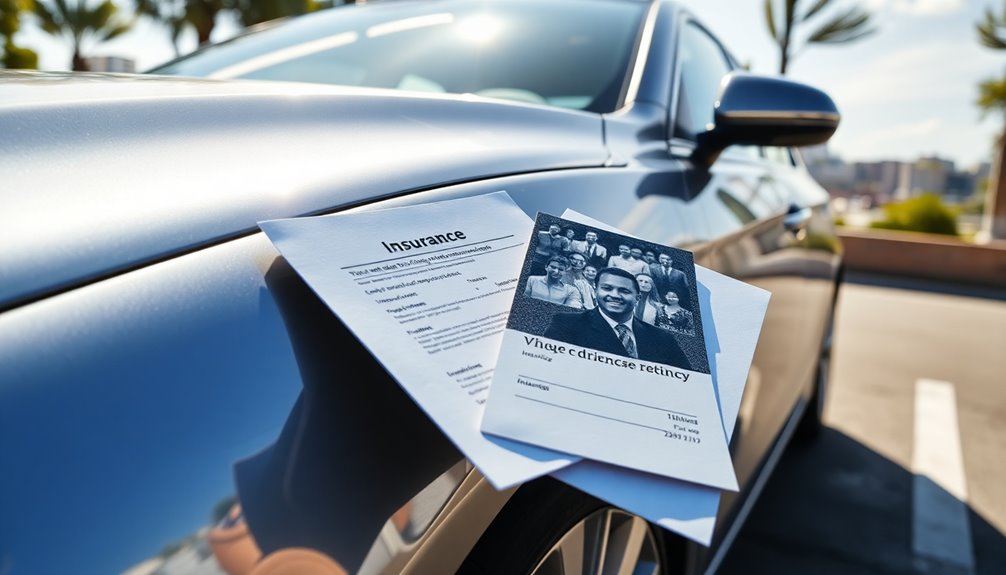
To lease a car, you'll typically need to provide documentation that verifies your residency. This is vital for the leasing process, guaranteeing your permanent address is accurately recorded. One common requirement is a utility bill, such as water, gas, or electricity, dated within the last 30 days. This serves as solid proof of residency.
Acceptable documents for verifying residency may also include bank statements and government correspondence that display your name and address. Lease agreements can be submitted as well, but make sure they clearly show your details.
Some dealerships might ask for additional documentation, like a recent tax return or pay stub, to confirm your residency alongside your identity.
It's essential to guarantee that all your residency documentation meets the requirements. This clarity helps you avoid delays in the application process, making it smoother and quicker.
Down Payment and Fees
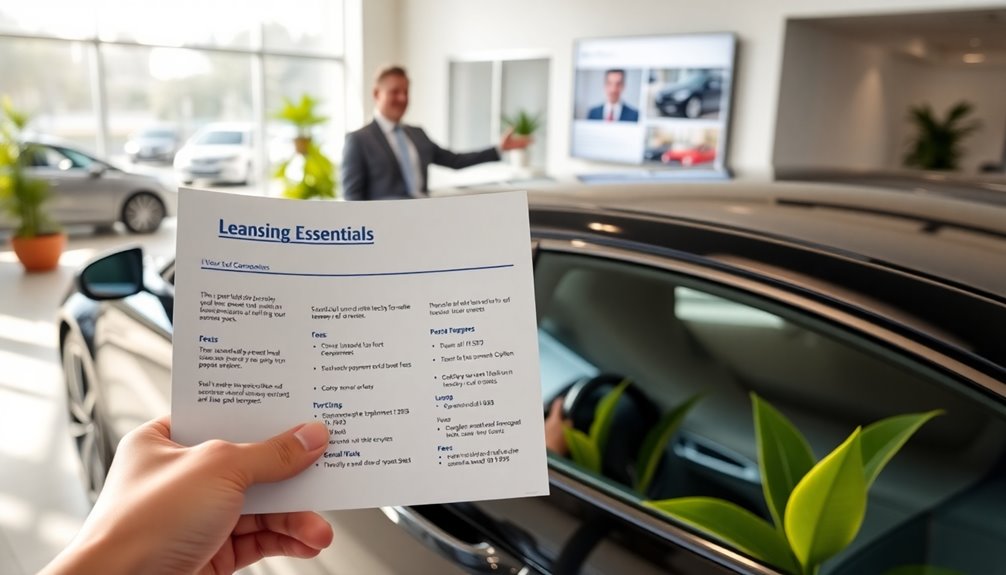
When leasing a car, you typically need to make a down payment that's about one or two monthly payments. Besides that, be prepared for additional fees like acquisition and disposition fees, which can add to your overall cost. It's smart to clarify and negotiate these costs upfront to avoid any surprises later. Additionally, understanding the mileage limits established in the lease agreement can help you better manage potential excess fees.
Required Down Payment Amount
Leasing a car often involves a required down payment that can greatly impact your monthly payments. Typically, this down payment ranges from one to two monthly payments. While some dealerships might offer "no money down" leases, these are quite rare.
Consider the following key points when determining your down payment amount:
- Credit Score: A better credit score can lead to lower down payment requirements and better lease terms.
- Larger Down Payment: Opting for a larger down payment can considerably reduce your monthly lease payments, making the overall lease more affordable in the long run.
- Vehicle Purchase Price: The required down payment often varies based on the vehicle's purchase price and any promotional offers from the dealership.
It's essential to clarify with the dealership whether the down payment includes additional fees, such as acquisition fees or document fees.
Depending on your lease agreement, you might even roll some of the down payment into your monthly payments, which can affect the overall cost of leasing a car. Understanding these factors helps you make a more informed decision when leasing your next vehicle.
Understanding Additional Fees
Before you sign a lease agreement, it's vital to understand the additional fees that can accompany your down payment. Typically, a down payment ranges from one to two monthly payments, but some rare deals may offer no down payment at all.
When leasing a vehicle, you'll encounter acquisition fees, which can range from $300 to $1,000 just for initiating the lease.
Don't forget about the security deposit, often equivalent to one month's payment, which may be refundable at the end of your lease term, depending on the vehicle condition.
Watch out for excess mileage fees, too. If you exceed the agreed annual mileage limit, expect to pay between $0.12 and $0.30 for each extra mile.
At the end of your lease, you might face disposition fees, generally around $300 to $500, for returning the vehicle.
Additionally, be prepared for charges related to excessive wear and tear, which can add to your monthly payments. Understanding these fees will help you budget better and avoid surprises as you navigate your leasing experience. Furthermore, knowing the end-of-lease options available to you can provide additional peace of mind as your lease term concludes.
Lease Term Conditions
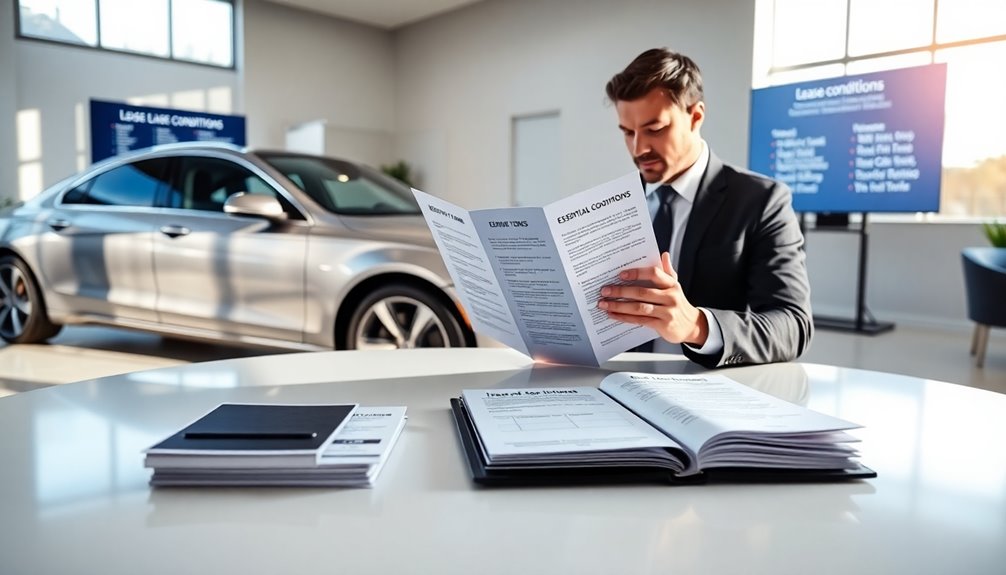
Understanding lease term conditions is essential for anyone evaluating a car lease. These conditions greatly impact your financial situation and overall leasing experience. Generally, leases range from 1 to 6 years, with 2 to 3 years being the most common.
Here are a few key aspects to examine:
- Monthly Payments: Your monthly payments depend on negotiated terms, down payment amounts, and the vehicle's residual value.
- Annual Mileage Limits: Most lease agreements set annual mileage limits between 10,000 to 15,000 miles. Exceeding these limits can lead to excess mileage penalties ranging from $0.12 to $0.30 per mile.
- Wear and Tear: You must maintain the vehicle according to manufacturer guidelines. Charges for excessive wear and tear may apply at the end of the lease term.
At the end of your lease, you typically have options to return the vehicle, purchase it at the agreed residual value, or perhaps renew the lease.
Understanding these lease term conditions will help you make informed decisions and avoid unexpected costs throughout your leasing journey.
Mileage Restrictions
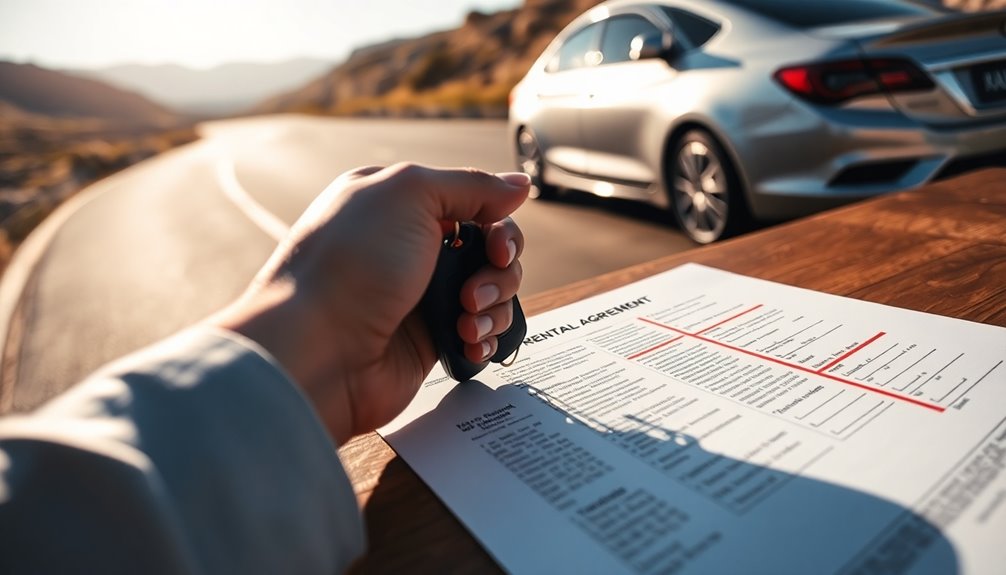
When entering a car lease, mileage restrictions play a significant role in your overall experience and costs. Most lease agreements set annual mileage limits typically ranging from 10,000 to 15,000 miles, influenced by your driving habits.
It's important to assess your personal driving patterns before signing a lease contract to avoid exceeding the mileage limit. If you do surpass the mileage cap, you'll face excess mileage fees, which can range from $0.12 to $0.30 for each additional mile driven.
In 2021, the average U.S. driver logged about 13,500 miles, highlighting the need to understand your typical annual mileage. Some leasing companies offer higher mileage options for an additional cost, while others might impose lower limits, resulting in unexpected fees.
To navigate this effectively, think about your driving habits, especially any changes that may have occurred post-pandemic. By carefully considering these factors, you can choose a mileage cap that aligns with your lifestyle and avoid unnecessary expenses.
Always review the mileage limits in your lease agreement to guarantee you make an informed decision that suits your needs.
Additional Charges and Negotiations

Maneuvering additional charges in a car lease can save you from unexpected expenses down the road. Understanding these charges is essential for keeping your lease payments manageable. Here are three key areas to focus on:
- Negotiate the Capitalized Cost: This is the vehicle's selling price. Negotiating it down can greatly lower your monthly payments and overall lease cost.
- Money Factor Awareness: The money factor represents the interest rate on your lease. Even a small reduction here can lead to considerable savings throughout the lease term.
- Wear and Tear & Excess Mileage Charges: Be mindful of how wear and tear is defined in your lease. Understanding what constitutes excessive damage can help you avoid costly fees.
Also, excess mileage charges can add up—typically ranging from $0.12 to $0.30 per mile over the agreed limit.
Always ask about potential dealer incentives or discounts, as these can further lower your overall lease cost. By being proactive and negotiating these terms, you can enjoy a more affordable leasing experience without hidden surprises.
Frequently Asked Questions
What Credit Score Do I Need to Lease a Car?
To lease a car, you typically need a credit score of at least 660, but aiming for 700 or higher will get you the best terms.
Scores around 737 are common among lessees, indicating that good credit is the norm.
If your score's below 600, you might still qualify, but expect stricter requirements and less favorable conditions.
Keep in mind, a lower score can lead to higher costs and larger down payments.
What Are the Steps to Leasing a Car?
Leasing a car might feel like a thrilling adventure!
First, research vehicle types that fit your budget and lifestyle.
Next, schedule test drives to see which one feels right.
After that, confirm lease availability and compare offers at different dealerships.
Be sure to review the lease terms carefully, focusing on mileage limits and fees.
What Factors Do You Consider When Leasing a Car?
When leasing a car, you should consider several key factors.
First, check your credit score; a higher score helps secure better terms.
Next, think about your annual mileage needs, as leases have limits.
Evaluate the total lease price, including fees and taxes, since this affects your monthly payments.
Don't forget to review the lease terms carefully and compare offers from different dealerships to find the best deal that suits you.
What Is the 1% Rule in Car Leasing?
"When it rains, it pours," but you can keep your finances dry with the 1% rule in car leasing.
This guideline suggests your monthly lease payment shouldn't exceed 1% of the vehicle's MSRP. For instance, if the MSRP is $30,000, aim for a payment around $300.
While this rule helps you gauge affordability quickly, remember it doesn't cover taxes or fees, so always consider those when evaluating lease offers.
Conclusion
Leasing a car can be a smooth process if you meet the essential requirements. After all, who wants to face unexpected hurdles when you're excited about your new ride? By ensuring you have a good credit score, proof of income, and the necessary documentation, you can hit the road without a hitch. So, gear up and prepare—your dream car is just a lease away! Remember, being well-prepared makes all the difference in your leasing experience.










